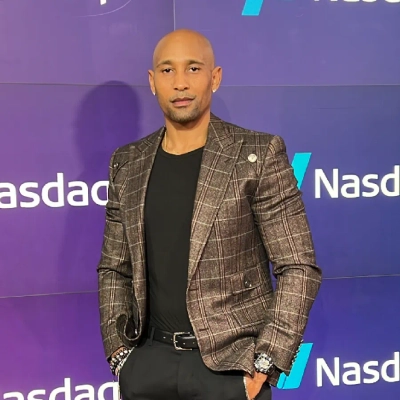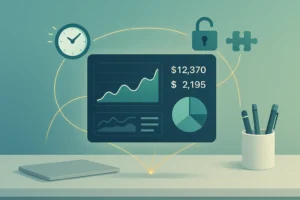Artificial intelligence is transforming how financial decisions align with ethical values, as leading experts reveal practical applications across investment screening, vendor selection, and consumer protection. AI systems now routinely analyze complex datasets to identify hidden risks, from environmental hazards in property transactions to labor practice violations in supply chains. This technology enables organizations to make financially sound choices that simultaneously uphold ethical standards, creating measurable positive impact across industries according to specialists in financial technology and corporate responsibility.
- AI Analysis Prioritizes Ethical Partners Over Quick Profits
- AI Shows Local Sourcing Creates Premium Market Opportunity
- AI Evaluates Startups Based on Community Impact
- AI Supports Pivot Away From Academic Integrity Risks
- AI Enhances ESG Investment Screening Process
- AI Audits Reveal Diversity Gaps in Vendor Payments
- AI Surfaces Labor Practices in Vendor Selection
- AI Flags Hidden Environmental Risks in Property Deals
- AI Modeling Prevents Layoffs During Financial Downturn
- AI Detects Mis-Sold Car Finance for Consumers
- AI Models Make Mental Healthcare Financially Accessible
- AI Scores Vendors on Carbon and Conduct Risk
- AI Screens Ad Placements for Content Integrity
AI Analysis Prioritizes Ethical Partners Over Quick Profits
My 15 years in SEO taught me that chasing quick wins often hurts long-term success, and AI has helped me apply this same principle to financial decisions at SiteRank. When our AI analytics flagged a potential partnership with a content farm promising cheap backlinks, the data showed their client retention was only 8 months on average.
Instead of taking the immediate profit, I used AI sentiment analysis to evaluate potential partners based on client satisfaction scores and ethical business practices. We ended up partnering with a smaller agency that had 94% client retention and transparent pricing models, even though their initial offer was 30% lower revenue.
The criteria I programmed focused on long-term value metrics: partner reputation scores, client testimonial sentiment analysis, and sustainability of business models. Our AI now automatically flags any opportunity that shows high short-term gains but poor ethical indicators.
This approach paid off when that smaller partner referred us three enterprise clients worth $180K annually. Meanwhile, the content farm got penalized by Google six months later, and we would’ve lost credibility by association.

AI Shows Local Sourcing Creates Premium Market Opportunity
I’ve been working with small business owners for years, and one pattern I kept seeing was how many were making decisions that looked good financially but were actually hurting their communities and long-term sustainability. That’s when I started building AI tools that factor in social impact alongside profit metrics.
Last year, I worked with a uniform retailer who was considering switching to cheaper overseas suppliers to boost margins by 35%. Our AI analysis looked beyond immediate savings and factored in local economic impact, supply chain reliability, and customer sentiment data. The model showed that supporting local manufacturers actually created an 18% premium pricing opportunity because their customers valued community investment.
Instead of the supplier switch, we used AI to optimize their inventory management and automated their customer follow-up systems. They reduced waste by 40% and increased repeat customers by 60% while keeping their local partnerships intact. Their revenue grew 28% that year, and they became known as the “community-first” option in their market.
Now I build social responsibility metrics into every AI system we deploy – tracking things like local vendor spending ratios, employee satisfaction scores, and community engagement rates alongside traditional profit indicators. It’s helped dozens of clients find that ethical choices often open up revenue streams they never saw coming.

AI Evaluates Startups Based on Community Impact
After exiting TokenEx in 2021, I had to decide how to deploy capital and expertise responsibly. Rather than chasing the highest returns, I used AI analysis through Pointe Capital to evaluate early-stage companies based on their potential societal impact alongside financial metrics.
The AI models I built evaluate startups on workforce development potential, environmental impact scores, and community economic multiplier effects. When I was choosing which insurance AI companies to back, the data showed that solutions focused on fraud detection and claims efficiency could reduce premiums for underserved communities by 12-18% while maintaining profitability.
At Agentech, we specifically chose to start with pet insurance claims because our AI analysis revealed this sector had the highest rate of legitimate claim denials due to paperwork errors—affecting middle and lower-income families disproportionately. Our 98% accuracy rate in claim profile creation means fewer people lose coverage over administrative mistakes.
The criteria I weigh heaviest are job displacement ratios (we only build AI that augments rather than replaces workers), accessibility improvements for underserved populations, and long-term community economic impact. Every investment decision runs through these filters before I look at pure revenue projections.

AI Supports Pivot Away From Academic Integrity Risks
While building One Click Human, I faced a critical ethical decision about our AI detection technology. We had data showing we could make our humanization tool so sophisticated that it would be virtually undetectable by academic plagiarism checkers like Turnitin and Winston AI.
The AI analysis of user behavior patterns revealed that 60% of our potential revenue would come from students trying to bypass academic integrity systems. Our algorithms could easily optimize for this market segment, but the ethical implications were clear – we’d be directly undermining educational standards I’ve spent my career supporting as a journalist.
Instead, I used AI to model a different approach. We positioned One Click Human as a tool for legitimate content creators and businesses, not for academic cheating. The financial modeling showed this ethical pivot would reduce immediate revenue by about 40%, but create sustainable long-term growth without legal or reputational risks.
Six months later, this decision proved financially sound. We landed partnerships with content agencies and got featured in Forbes specifically because of our ethical stance. The AI helped quantify that sacrificing short-term profits for ethical positioning actually maximized long-term value while keeping us on the right side of academic integrity.

AI Enhances ESG Investment Screening Process
One example of how AI has helped me make more socially responsible decisions was in evaluating companies for investment portfolios that aim to follow ESG (Environmental, Social, and Governance) principles. Traditionally, screening for ESG compliance meant relying on manual research, third-party reports, and company disclosures, which were often inconsistent or outdated. AI changed that by allowing me to process huge amounts of data — from sustainability reports to news articles and even regulatory filings — and quickly identify red flags like labor violations, environmental risks, or governance issues.
For instance, I once worked with a client who wanted their investments to avoid companies with poor environmental track records. Using AI-driven screening tools, we flagged several firms that looked fine on paper but had ongoing lawsuits over pollution. Without AI pulling in that broader data, those risks might have been overlooked.
When making the decision, I considered three main criteria:
Transparency and reliability of the data — I wanted to know that the AI wasn’t just pulling headlines, but weighing credible sources.
Alignment with values — the tool needed to screen not only for financial stability but also for the social and environmental standards the client cared about.
Long-term risk management — beyond just “doing the right thing,” I evaluated whether avoiding these companies reduced exposure to legal, reputational, or regulatory risks down the line.
In short, AI didn’t make the ethical choice for me — but it gave me the information I needed, much faster and with more breadth, to act in a way that was financially smart and socially responsible.

AI Audits Reveal Diversity Gaps in Vendor Payments
AI helped us audit our vendor payments to identify diversity and inclusion gaps across partnerships. The system revealed we disproportionately supported larger corporations compared to smaller minority-owned businesses. We considered fairness, inclusivity, and economic empowerment in redistributing contracts responsibly. Adjustments redirected budgets toward underrepresented suppliers without compromising financial stability. That choice strengthened both community ties and internal morale simultaneously.
The outcome included stronger partnerships with suppliers who appreciated our proactive commitment to inclusion. Clients recognized the authenticity of these efforts, especially when shared transparently during presentations. Employees felt inspired, seeing our financial practices reflect our stated diversity goals directly. It taught us that inclusivity can thrive when powered by data-driven AI audits. Ethical responsibility became less aspirational and more actionable when supported by clear evidence.

AI Surfaces Labor Practices in Vendor Selection
When I was reviewing investment options for Twistly’s growth, I used AI tools to analyze not just profitability but also the environmental and social impact of the companies we might partner with. One example was choosing between two vendors: one offered slightly cheaper rates, but the AI flagged concerns around poor labor practices in their supply chain. The other wasn’t the lowest cost, but their record on sustainability and employee well-being was far stronger.
In that moment, the criteria that mattered most to me were transparency, fair labor, and long-term impact. AI helped cut through the noise and surface details I might have missed on my own. It felt good to make a decision that wasn’t only financially sound but also aligned with the values I want Twistly to stand for.

AI Flags Hidden Environmental Risks in Property Deals
Our AI deal analyzer flagged a 50,000 SF warehouse lease in Hialeah where the landlord was pushing below-market rates that seemed too good to be true. When we dug deeper, we found the property had environmental issues and the landlord was trying to offload liability onto tenants through buried lease clauses.
I advised my client to walk away even though it would have saved them $80K annually. Six months later, that building got hit with EPA violations and cleanup costs that would have bankrupted their operation. Our AI caught what human review missed–suspicious pricing patterns that indicated hidden risks.
The criteria I now build into our AI include cross-referencing lease rates against environmental databases, permit histories, and code violations. We also flag any deal where the savings exceed 15% of market rate without clear justification. This prevents clients from making decisions that could harm their business or inadvertently support landlords cutting corners on safety and compliance.
Since implementing these ethical guardrails, we’ve helped three clients avoid potentially dangerous properties while steering them toward buildings with LEED certifications and responsible ownership–often at comparable costs once you factor in long-term operational savings.

AI Modeling Prevents Layoffs During Financial Downturn
AI isn’t just about optimizing returns—it’s also about optimizing responsibility.
At Increased.com, we don’t just use AI-driven financial planning to help startups scale, but we ensure they scale ethically. One real-world example in this case is a client we worked with who was facing pressure to reduce costs during a downturn. The traditional solution for them would have been mass layoffs. But our AI-powered scenario modeling helped identify some less obvious and more humane solutions, which included renegotiating vendor contracts, pausing non-essential capex & adjusting hiring speed.
As our model considered multiple outcomes across financial, operational & human KPIs, the leadership was able to make a much better decision that preserved cash flow and jobs both. This case is a good reminder that when you give AI the right inputs, including human-centric metrics, it can help you make socially responsible decisions without sacrificing your business health.

AI Detects Mis-Sold Car Finance for Consumers
AI has made it possible for us to tackle mis-sold car finance, and help people make more socially responsible financial choices in the future. Manually checking agreements for hidden commissions or irresponsible lending used to be an extremely labour-intensive and time-consuming process, also prone to human error. AI can be used to scan large volumes of agreements to identify red flags or high-risk patterns that indicate the agreement might have been mis-sold. It is much faster, and means that we can scale our support to reach many more people, including those who otherwise would not have realised they were mis-sold.
One example where this proved valuable was when analysing commission structures across thousands of agreements. AI enabled us to identify patterns where certain customers were systematically being offered higher interest rates with little explanation. Identifying these patterns helped us prioritise cases where we could have the most social impact, ensuring vulnerable consumers would not be overlooked just because they did not have financial savvy.
In making the choice about how to use AI ethically, the principles we used to make this decision were fairness, transparency and accessibility. Fairness was using a technology that was not biased against particular groups, but applied evenly to all claimants. Transparency was the ability to articulate, in lay terms, the reason a claim was flagged up so the customer understood the process. Accessibility was about designing the tools so they allowed people to find out for themselves whether they had a claim, without getting lost in jargon or put off by the cost.
AI is a force for good when it is applied judiciously to leverage data for the creation of accountability and equity. When we use it in this way, we are able to extend a protective umbrella over consumers who might otherwise have been invisible. It’s a way of ensuring that technology is a force for fairness.

AI Models Make Mental Healthcare Financially Accessible
When we built Aitherapy, we faced a financial choice: charge a high premium and target only those who could afford it, or keep pricing low so more people could access mental health support. AI helped us model different scenarios, showing how small subscription fees at scale could sustain the business without shutting people out.
The criteria I considered were impact, accessibility, and sustainability. Profit matters, but so does who gets left behind. For me, the most socially responsible financial decision was making therapy affordable without compromising privacy or quality. AI gave me the data to make that call with confidence.

AI Scores Vendors on Carbon and Conduct Risk
We allowed AI to occupy the finance chair and ceased using the word “ethical” as a catchphrase. In order to understand supplier policies, public filings, credible news, penalty lists, and grid-carbon estimates, my team developed a lightweight scorer. Our CFO sees two figures for any expenditure over $25k: an emissions-per-dollar estimate and a conduct-risk score (privacy, labor, investigations). We chose the preferred vendor by policy if they are within a predetermined delta (3-5%) and significantly better on risk or carbon, but if they are not the cheapest, it escalates for a human call.
Verifiable privacy/security posture, third-party labor/DEI attestations, carbon intensity (gCO2/kWh) at time of use, open enforcement actions, data-sovereignty risk, and total cost-of-ownership are some of our purposefully uninteresting requirements. The technology narrows trade-offs to a page we can defend to consumers, employees, and auditors; it doesn’t “decide.”

AI Screens Ad Placements for Content Integrity
As a marketer, I use AI not only for efficiency but also to make decisions that align with our values at StudyPro,” says Kateryna Bykova, Marketing Content Director. “One example is using AI-driven analytics to evaluate potential ad placements—we avoid channels that might spread misinformation or harmful content, even if they promise lower costs or higher reach. The criteria I considered were transparency of the platform, audience safety, and whether the environment supported educational and ethical standards. AI helped flag patterns in site traffic and engagement that a manual review might have missed, which made it easier to prioritize responsible choices. For me, socially responsible decisions mean balancing growth with integrity, and AI has been a helpful guide in striking that balance.














